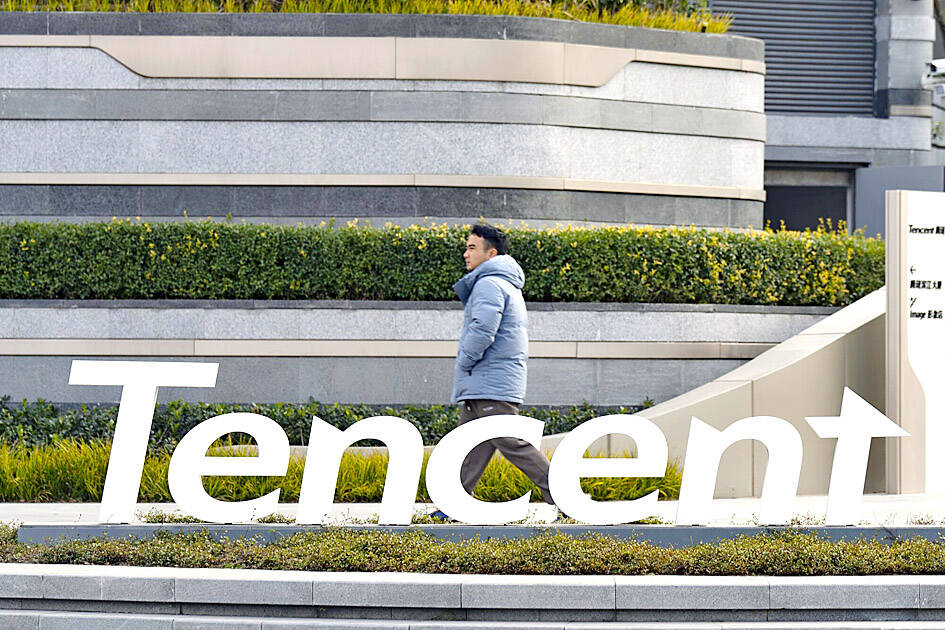The US Department of Defense has added Chinese technology giant Tencent Holdings Ltd (騰訊) and battery manufacturer Contemporary Amperex Technology Co Ltd (CATL, 寧德時代新) to a list of companies it says are affiliated with Beijing’s military.
Tencent shares yesterday plummeted more than 7 percent in Hong Kong, while CATL briefly sank more than 5 percent in Shenzhen before paring the losses.
The two firms were included on a list of Chinese military companies operating in the US that was due to be published yesterday on the US Federal Register, with copies available for download the day before.

Photo: Bloomberg
Tencent is one of the top players in China’s expansive technology sector, operating the WeChat (微信) “super app,” with other offerings across gaming, content streaming and cloud services.
CATL is also a major firm, producing more than one-third of the electric vehicle batteries sold in the world.
They have been used in models from a long line of foreign manufacturers, including Mercedes-Benz AG, BMW AG, Volkswagen AG, Toyota Motor Corp, Honda Motor Co and Hyundai Motor Group.
Tencent said that it intends to engage in discussions with US authorities as part of a process “to correct this mistake.”
The company would “undertake legal proceedings” if necessary to remove itself from the list, it said in a statement published yesterday on the Hong Kong Stock Exchange Web site.
CATL also said its inclusion on the list was a “mistake” and the company is “not engaged in any military related activities.”
“We welcome responsible discourse on our business operations and take questions about our business seriously,” it said in a statement.
The National Defense Authorization Act for Fiscal Year 2021 required the US secretary of defense to identify Chinese military companies operating directly or indirectly in the US and submit a list to the US Congress, with the unclassified portion of the list to be published on the US Federal Register.
The list does not have direct legal implications for the companies in question, but can affect their reputations, and listed firms have sued over their inclusion in the past.
The US considers China its primary rival, and Washington has for years rolled out measures targeting technology companies over national security concerns and fears that technology could be used by Beijing for military purposes.
Beijing yesterday criticized Washington’s latest move as “unreasonable suppression of Chinese enterprises,” and urged the US to “immediately correct its wrong practices.”
“China is always firmly opposed to the US side’s generalization of the concept of national security,” Chinese Ministry of Foreign Affairs spokesman Guo Jiakun (郭嘉昆) said at a regular news conference.

Sweeping policy changes under US Secretary of Health and Human Services Robert F. Kennedy Jr are having a chilling effect on vaccine makers as anti-vaccine rhetoric has turned into concrete changes in inoculation schedules and recommendations, investors and executives said. The administration of US President Donald Trump has in the past year upended vaccine recommendations, with the country last month ending its longstanding guidance that all children receive inoculations against flu, hepatitis A and other diseases. The unprecedented changes have led to diminished vaccine usage, hurt the investment case for some biotechs, and created a drag that would likely dent revenues and

Global semiconductor stocks advanced yesterday, as comments by Nvidia Corp chief executive officer Jensen Huang (黃仁勳) at Davos, Switzerland, helped reinforce investor enthusiasm for artificial intelligence (AI). Samsung Electronics Co gained as much as 5 percent to an all-time high, helping drive South Korea’s benchmark KOSPI above 5,000 for the first time. That came after the Philadelphia Semiconductor Index rose more than 3 percent to a fresh record on Wednesday, with a boost from Nvidia. The gains came amid broad risk-on trade after US President Donald Trump withdrew his threat of tariffs on some European nations over backing for Greenland. Huang further

CULPRITS: Factors that affected the slip included falling global crude oil prices, wait-and-see consumer attitudes due to US tariffs and a different Lunar New Year holiday schedule Taiwan’s retail sales ended a nine-year growth streak last year, slipping 0.2 percent from a year earlier as uncertainty over US tariff policies affected demand for durable goods, data released on Friday by the Ministry of Economic Affairs showed. Last year’s retail sales totaled NT$4.84 trillion (US$153.27 billion), down about NT$9.5 billion, or 0.2 percent, from 2024. Despite the decline, the figure was still the second-highest annual sales total on record. Ministry statistics department deputy head Chen Yu-fang (陳玉芳) said sales of cars, motorcycles and related products, which accounted for 17.4 percent of total retail rales last year, fell NT$68.1 billion, or

Macronix International Co (旺宏), the world’s biggest NOR flash memory supplier, yesterday said it would spend NT$22 billion (US$699.1 million) on capacity expansion this year to increase its production of mid-to-low-density memory chips as the world’s major memorychip suppliers are phasing out the market. The company said its planned capital expenditures are about 11 times higher than the NT$1.8 billion it spent on new facilities and equipment last year. A majority of this year’s outlay would be allocated to step up capacity of multi-level cell (MLC) NAND flash memory chips, which are used in embedded multimedia cards (eMMC), a managed